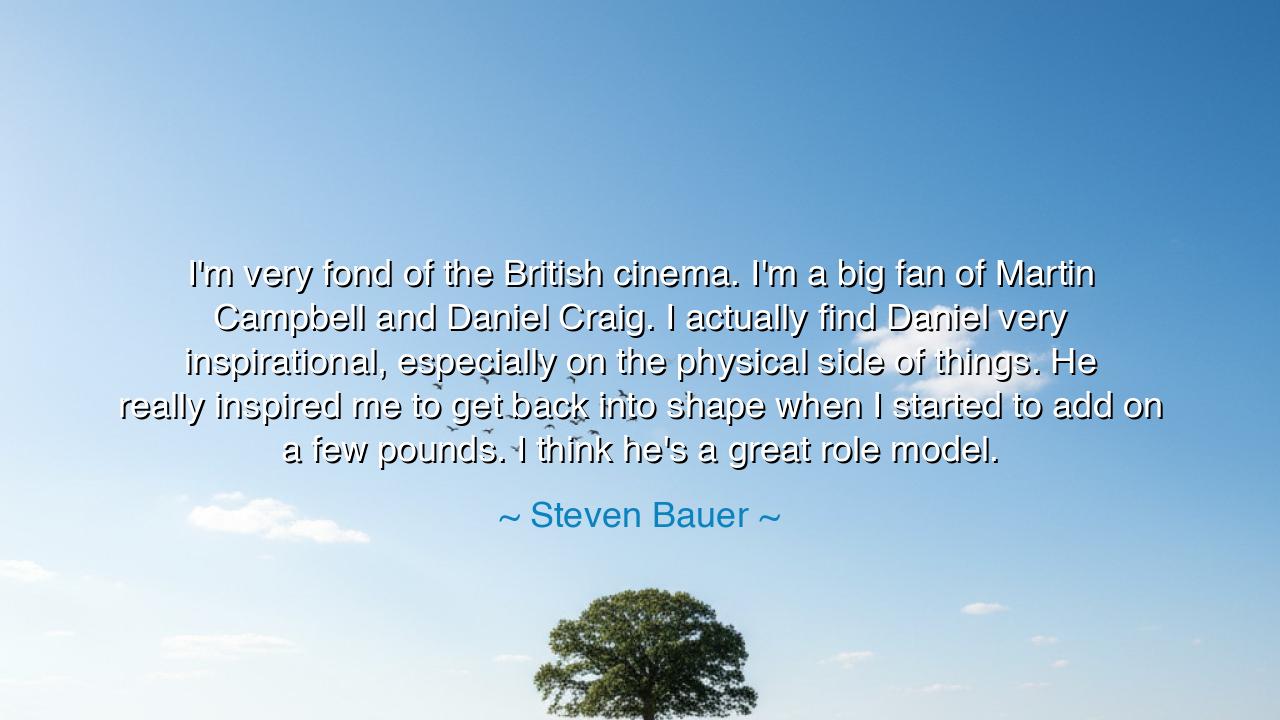
I'm very fond of the British cinema. I'm a big fan of Martin
I'm very fond of the British cinema. I'm a big fan of Martin Campbell and Daniel Craig. I actually find Daniel very inspirational, especially on the physical side of things. He really inspired me to get back into shape when I started to add on a few pounds. I think he's a great role model.






In the candid and heartfelt words of Steven Bauer, we hear more than admiration; we hear the echo of an ancient truth: “I'm very fond of the British cinema. I'm a big fan of Martin Campbell and Daniel Craig. I actually find Daniel very inspirational, especially on the physical side of things. He really inspired me to get back into shape when I started to add on a few pounds. I think he's a great role model.” Though spoken in the tone of friendly reflection, these words reveal the timeless cycle of inspiration — how one person’s excellence can awaken another’s discipline, how strength seen in another can reignite strength long forgotten within oneself. Bauer’s sentiment is not simply about admiration; it is about renewal — about the human power to be moved, changed, and reborn through the example of others.
The meaning of his words lies in the recognition that inspiration is both a mirror and a spark. When Bauer speaks of Daniel Craig as a “role model,” he speaks of a man whose physical dedication, courage, and craft reflect a deeper virtue — that of mastery through effort. In a world where many seek comfort over challenge, the disciplined artist stands as a reminder of what human beings can become when they commit fully to their purpose. Craig, famed for his portrayal of James Bond, embodies the spirit of the warrior-artist: powerful, elegant, and unrelenting. In seeing him, Bauer found a reflection of his own potential — and this, perhaps, is the truest form of inspiration, not the desire to become another, but the awakening of what one might yet be.
The origin of this wisdom stretches back to the dawn of storytelling itself. The ancients, too, understood that heroes serve not to be worshipped, but to be emulated. When the Greeks spoke of Achilles, they did not mean for men to mourn his glory but to find courage in their own hearts. When the Romans honored Hercules, they saw not a god, but a mortal who endured and overcame. So too does Bauer’s admiration for Daniel Craig echo this ancient pattern — the recognition that every generation must look upon its heroes, not with envy, but with the resolve to rise. The artist, whether actor, soldier, or craftsman, becomes a vessel of that eternal flame which lights others toward excellence.
When Bauer says that Craig inspired him to “get back into shape,” he is not merely speaking of the body — he is speaking of discipline, of self-restoration. The body, in the teachings of both philosophers and warriors, has always been the temple of the spirit. To strengthen it is to honor the divine energy within. The Stoics, such as Epictetus and Marcus Aurelius, believed that mastery of the body and mastery of the mind are bound together — one cannot remain strong while the other decays. Thus, in this seemingly simple act of returning to health, Bauer enacts a principle as old as time: the rediscovery of balance, the restoration of dignity through effort.
We must also notice his reverence for British cinema, and particularly for Martin Campbell, whose direction shaped Daniel Craig’s defining performances. This respect reveals another truth — that inspiration flows not from one, but from many; that creation is never solitary. Behind every shining hero stands a mentor, a teacher, a guide. In ancient Athens, the sculptor Phidias had his apprentices; in Japan, the samurai trained under masters of both sword and spirit. So too does Bauer remind us that greatness is a shared endeavor — a chain of influence linking hearts across time, nations, and generations.
Yet, beneath all these words lies humility. Bauer, a man of talent and accomplishment himself, does not speak from arrogance but from gratitude. He acknowledges that even the accomplished must be reawakened — that no one, however seasoned, stands above the need for inspiration. This humility is the mark of true wisdom. The ancients called it sophrosyne — the virtue of self-awareness, the understanding that greatness is not a destination but a continual becoming. In admitting that he, too, needed to rekindle his flame, Bauer reveals a truth the proud often forget: that renewal begins not in strength, but in openness.
Thus, the lesson of Bauer’s reflection is this: allow yourself to be inspired, and let that inspiration move you to action. Do not dismiss admiration as weakness; it is, rather, the bridge between potential and achievement. Seek out those who embody discipline and excellence — not to imitate them blindly, but to awaken your own sleeping virtues. Strengthen the body, refine the craft, honor the work — for in doing so, you honor the divine spark that dwells within you.
And so, as the ancients would say, let the role models of your age — whether on screen, in art, or in life — be your modern heroes. Let their excellence be your compass, their effort your mirror. Like Steven Bauer, who saw in another man’s devotion a reflection of his own, learn to look outward in order to look inward. For in that act of reverent imitation, the human spirit finds its rhythm again — and from the example of one, the fire of many may rise.






AAdministratorAdministrator
Welcome, honored guests. Please leave a comment, we will respond soon